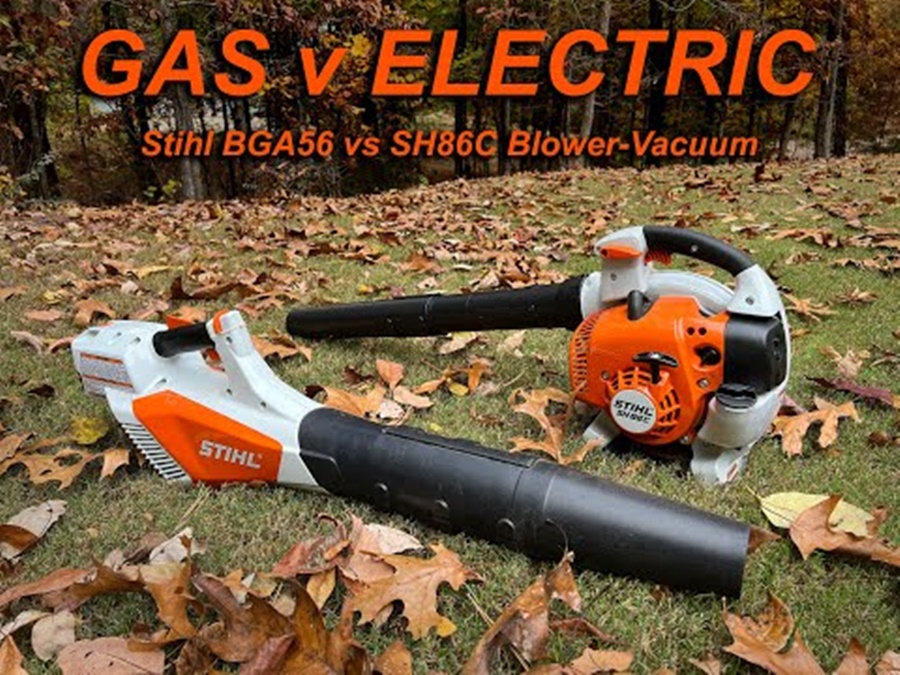When it comes to choosing the best leaf blower, the debate between electric blowers vs gas blowers has been ongoing for years. Each type comes with its own strengths, drawbacks, and ideal use cases. In this comprehensive comparison, we break down every factor you need to consider before making your purchase. From power output and maintenance requirements to environmental impact and cost efficiency, we examine the true performance of both gas-powered and electric-powered blowers.
Power and Performance: Gas vs Electric Blowers
When measuring sheer blowing power, gas blowers generally take the lead. Designed for heavy-duty outdoor work, gas models typically offer higher cubic feet per minute (CFM) and miles per hour (MPH) ratings, enabling them to move large volumes of debris, even wet leaves and twigs.
On the other hand, electric blowers, especially cordless battery-powered blowers, have significantly improved over the past decade. High-end models now offer comparable airflow and velocity, with brushless motors and high-capacity lithium-ion batteries delivering consistent power for residential tasks.
Gas Blower Advantages:
- Higher CFM and MPH for tough debris
- Longer runtime for extended jobs
- Better for large yards, commercial use
Electric Blower Advantages:
- Instant startup with a push button
- Quiet operation suitable for noise-sensitive areas
- Zero emissions during operation
Power Source and Portability: Corded vs Cordless vs Gas
Corded electric blowers are limited by their dependence on a power outlet, which can restrict mobility. However, they offer unlimited runtime—ideal for small yards or close-range tasks.
Cordless electric blowers, while more portable, depend on battery life. Most modern models run for 20 to 60 minutes per charge, depending on the power setting and battery size.
Gas blowers, meanwhile, rely on a gasoline-oil mix for two-stroke engines, or just gas for four-stroke engines. They offer unrestricted mobility and longer runtime—but at the cost of frequent refueling and engine maintenance.
Environmental Impact: Which Blower is Greener?
Electric blowers are clearly more environmentally friendly. They produce zero emissions on-site, and many are built using recyclable components. Furthermore, they are much quieter, reducing noise pollution—a growing concern in suburban neighborhoods.
In contrast, gas blowers emit carbon monoxide, hydrocarbons, and nitrogen oxides, contributing to air pollution. According to the California Air Resources Board, one hour of operation from a gas leaf blower can produce as much pollution as driving a modern car over 1,100 miles.
Cost of Ownership: Initial Investment vs Long-Term Maintenance
Electric blowers generally come with a lower upfront cost, especially for corded models. Even high-end cordless units with batteries and chargers are often less expensive over time, thanks to minimal maintenance.
Gas-powered blowers, however, require:
- Fuel and oil purchases
- Spark plug replacements
- Air filter cleaning or replacement
- Engine servicing
Over a few seasons, these maintenance tasks can significantly increase the total cost of ownership.
Maintenance Requirements: Ease of Use
Electric blowers require virtually no maintenance. There’s no engine to tune, no oil to mix, and no pull cords. Simply charge the battery or plug in, and you’re ready to go.
In contrast, gas blowers demand regular attention:
- Mixing fuel (for 2-stroke engines)
- Engine cleaning
- Replacing filters and spark plugs
- Winterizing for off-season storage
These steps make gas blowers more suitable for experienced users or those willing to handle ongoing upkeep.
Weight and Ergonomics: User Comfort Comparison
Electric models, especially cordless units, are lighter and easier to handle. Many weigh less than 10 pounds, making them ideal for extended use without causing arm fatigue. Features like soft-grip handles, variable speed triggers, and adjustable tubes further enhance comfort.
Gas blowers are typically heavier—up to 20 pounds or more—and may cause strain during prolonged use. Backpack-style gas blowers distribute the weight across the shoulders and back, but even then, they require more effort to operate.
Noise Levels: Keeping It Quiet
One of the biggest complaints about gas blowers is the excessive noise—often exceeding 100 decibels, which is above safe hearing levels. Some cities and homeowners associations have even banned gas-powered blowers due to their disruptive sound.
Electric blowers, by comparison, run much quieter. Most operate in the 60-75 decibel range, making them suitable for use in residential neighborhoods without disturbing the peace.
Best Use Cases for Electric and Gas Blowers
When to Choose an Electric Blower:
- You have a small to medium-sized yard
- You prefer low noise levels
- You want hassle-free operation
- You are environmentally conscious
- You need something lightweight and easy to maneuver
When to Choose a Gas Blower:
- You maintain a large property or commercial grounds
- You deal with wet leaves, pine needles, or heavy debris
- You need longer runtime without recharging
- You’re comfortable with engine maintenance
Market Trends and Technological Advances
The leaf blower market is rapidly shifting towards electric-powered models. With ongoing improvements in battery technology, even professionals are starting to adopt commercial-grade cordless blowers that rival the performance of gas machines.
Innovations such as:
- Brushless motors
- Variable speed controls
- Turbo boost modes
- Swappable battery platforms
…are making electric blowers more versatile and efficient than ever before.
Meanwhile, regulatory pressures on gas-powered equipment continue to increase, especially in states like California, where gas leaf blowers are being phased out entirely.
Conclusion
The choice between an electric blower vs gas blower depends largely on your specific needs.
For everyday homeowners, the electric blower especially cordless is the superior option. It’s cleaner, quieter, easier to use, and requires virtually no maintenance. Ideal for residential yards and seasonal cleanups. For landscapers or users with large, demanding properties, the gas blower still holds its ground due to its unmatched power and runtime. But with the pace of innovation in cordless tech, that gap is closing fast.








Leave a Reply